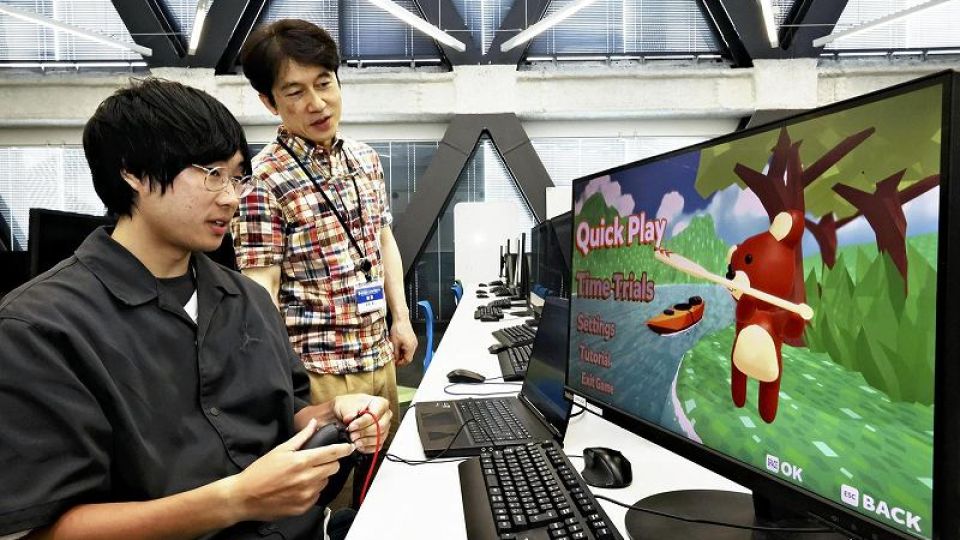October 13, 2025
TOKYO – Universities are stepping up their efforts to train video game creators.
With the domestic game market valued at more than ¥2 trillion, there is a need for talent from a diverse range of fields, including programmers, specialists in visual effects and music, and producers who can lead overseas expansion.
Related university majors and courses are expected to attract students, as creating video games is one of the most popular jobs among students.
New, integrated art form
In July, Tokyo University of the Arts announced that it would establish the Games and Interactive Arts Department under its Graduate School of Film and New Media in April 2026 and offer a master’s program. The university considers video games a “new, integrated art form of the modern era.” Digital technologies related to game visuals, musical expression and programming, among other skills, will be studied in the program, which will have an enrollment capacity of 20.
According to Mitsuko Okamoto, professor of anime and game planning and production, understanding the bone structure of a human body is essential when designing and animating characters just like sketching, for instance. “The more advanced games become, the more essential it is to have an artistic foundation,” Okamoto said at a press conference.
Katsuhiko Hibino, president of the university, said, “At this crucial moment, when Japanese video games need to be promoted globally, it is important to conduct research on games from a perspective unique to the university.”
Market doubles in 10 years
In the 1980s, when the Famicom family computer video game console went on sale, game creators were primarily programming engineers.
As game consoles became more advanced, a division of labor appeared, including dedicated personnel to create elaborate computer graphics, produce background music and sound effects, and develop ideas.
In and after the 2000s, the market expanded with the growing popularity of online video games. Intellectual property strategies related to film adaptation and production of character merchandise, for instance, have also gained importance.
“Large-scale video games cannot be made by engineers alone,” said a representative of Famitsu Group, which publishes a gaming magazine. “To keep pace with the intensifying competition in this area from countries like China and South Korea, we need talented people capable of working effectively in a team.”
The size of the domestic market was ¥2.5855 trillion in 2024, almost double the value from a decade ago, according to the Famitsu Game Hakusho 2025, a yearbook on the video game industry. Outside of Japan, the global gaming market grew to ¥31 trillion, with East Asian countries, including China and South Korea, accounting for the largest share at 44.1%.
According to the government’s New Cool Japan Strategy compiled in June last year, Japanese video games and other content are regarded as one of the nation’s core industries. The overseas market for Japanese content is ¥5.8 trillion, exceeding the ¥5.5 trillion export value of semiconductors.
Children’s top career choice
Game creator is now the most popular career choice among elementary and junior high school boys, according to a survey conducted last year by the Tokyo-based Computer Entertainment Supplier’s Association, which was formed by video game production companies and others.
The survey asked 3,689 elementary to high school students nationwide which jobs they wanted to have in the future.
Osaka Electro-Communication University, aiming to train video game creators, established the Digital Game Department in 2003 and the Tokyo Polytechnic University Game Department in 2010. Many other universities also offer majors or courses focused on video game studies.
“More universities are seeking to leverage the popularity of video games to attract students,” said an official of the Kawaijuku Educational Institution, a leading preparatory school.
International Professional University of Technology in Tokyo, which opened in fiscal 2020, offers the Game Production Course, covering game-related studies from programming to intellectual property strategy, at its Digital Entertainment Department.
The department attracted 365 applicants for its 80 available spots in the entrance exam in fiscal 2025, when 70% of professional and vocational universities nationwide failed to meet their recruiting targets.
“[Through the course] I’ve gained extensive skills, including those related to adaptability and planning,” said Yuma Tominaga, 22, a fourth-year student in the course. Tominaga has already secured a job at a game production company.
According to Prof. Naohiro Saito, chair of the Digital Entertainment Department, students in the department also study mathematics, English and comparative culture.
“With basic knowledge in a variety of fields, students can deepen mutual understanding among their team members at work,” said Saito who has years of experience in research and development at a game company. “Video game creators need wide-ranging knowledge more than anyone.”


